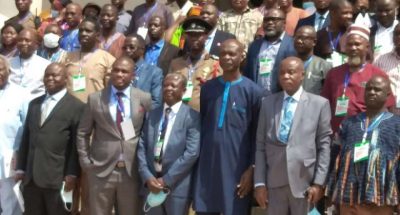The Minister for Education, Dr. Yaw Osei Edutwum has said the government of the Nana Addo Dankwa Akufo-Addo was working hard to ensure improvement
The Minister for Education, Dr. Yaw Osei Edutwum has said the government of the Nana Addo Dankwa Akufo-Addo was working hard to ensure improvement in the education governance and efficiency of service delivery.
According to the minister, government, within the last five years has been working hard to put in place appropriate legal, institutional and regulatory standards to improve the governance systems and the efficiency of service delivery in the country.
Dr. Yaw Osei Edutwum said this in a keynote address read on his behalf by Dr. Eric Nkansah, Technical Advisor/Director in charge of Tertiary Education at the Ministry of Education during the opening ceremony of the 2022 Harmattan School at the University for Development School (UDS).
“Prof. Chairman, permit me to underscore that the interventions of His Excellency Nana Addo Dankwa Akufo-Addo’s government in the education sector are unprecedented. Within these past five years, there have been concerted efforts by this government to put in place the relevant legal, institutional and regulatory framework to improve the governance and efficiency of education service delivery in Ghana,” he said
The 2022 Harmattan School
The 2022 Harmattan School was on the theme “Education for National Development: The Role of Academia, Industry and Development Partners” organized by the Institute of Interdisciplinary Research(IIR).
It was attended by people from academia, industry, security services, political, civil society organizations, and the media.
Education Challenges
Dr. Eric Nkansah bemoaned that the education sector, despite its enormous contributions to national development still faced with a myriad of challenges.
He added that government through the ministry was pursuing Whole-School reforms and policies aimed at producing a critical mass of assertive, employable, and empowered Ghanaians to spur the socio-economic transformation of the country.
He stressed that government was investing heavily in education transformation from the basic through to the tertiary level.
“Over the last five years, this Government has invested heavily and intensified efforts to transform the face of education right from Basic through to the Tertiary level. The ministry has been pursuing whole-school reforms and policies aimed at producing a critical mass of assertive, employable, and empowered Ghanaians to spur up the socio-economic transformation of our country,” Dr. Eric Nkansah intimated.
He revealed that Ghana’s current Gross Tertiary Enrollment Ratio (GTER) was 20 percent out of the set target of 40 percent to be achieved by 2030.
“As at today, Ghana’s GTER has increased from the 18.84 percent to 20 percent. Thus, we are making steady progress towards the realization of the 40 percent by 2030 or even earlier,” he noted.
Dr. Eric Nkansah thanked the management of the University for Development of Studies(UDS) for the initiative and appealed to the participants to give it their all so that at end of the two days they would be better informed
Professor Gabriel Ayum Teye, the Vice-Chancellor for the University, in his welcome address said the Harmattan School serves as a platform for researchers, Non-Governmental Organizations, policymakers and development partners to congregate and brainstorm on issues confronting education in Northern Ghana.
He added that the Harmattan School since its inception 15 years ago, has given the participant opportunity to share important ideas on various government policies and provided alternative solutions to reshape and strengthen those policies.
He indicated that education plays an important role in nation-building, noting that education empowers people to be problem solvers.
“Ladies and gentlemen, it is undeniable fact that education plays a pivotal role in nation-building. Through education, individuals grow personally, professionally and socially,” he stated.
Professor Ayum Teye called on stakeholders, development partners and academia to support the government to provide quality education for all children in Ghana.
He mentioned inadequate infrastructure for the overpopulation in schools, low salaries and incentives for educational workers and lack of training and uncommitted teaching staff as some challenges facing the provision of education in the country.
This he said the University was poised in promotion of tertiary education research and community services to serve the people.
Dr. Abdulai Abubakari, the Director of the Institute of Interdisciplinary Research (IIR) at the University on his part said the Harmattan School over the past 15 years, has been used as a medium to draw policymakers attention to the developmental challenges of the North and the country at large.
“Over the Harmattan School conference dealt with issues such as food security and poverty reduction, conflict management and peacebuilding, sanitation and health for development, climate change adaptation, accountable governance, politicizing education for national development, addressing youth unemployment in Ghana,” he stated.
He also acknowledged the contributions of individuals and organizations that have supported the IIR in organizing the Harmattan School since its inception in 2005 and called for a linkage between the educational system and the industry to revitalize education in Ghana.
Mr. Kofi Asare, Executive Director for the African Education Watch, in presenting a paper on the topic: “De-Politicizing Education Policy in Ghana: Our Collective Responsibility” bemoaned the practice of successive governments abandoning education projects as a key outcome of politicised education policy, costing the sector socially and economically.
He urged CSOs, academia, religious bodies and traditional authorities to speak against the politicization of scholarships, recruitment and procurement while calling for an independent, permanent advisory body for the Ministry of Education to ensure continuous compliance with Education Strategic Plans and reforms across regimes.
Mr. Asare also called on CSOs to commit political parties to continue inherited projects during pre-election engagements.

COMMENTS